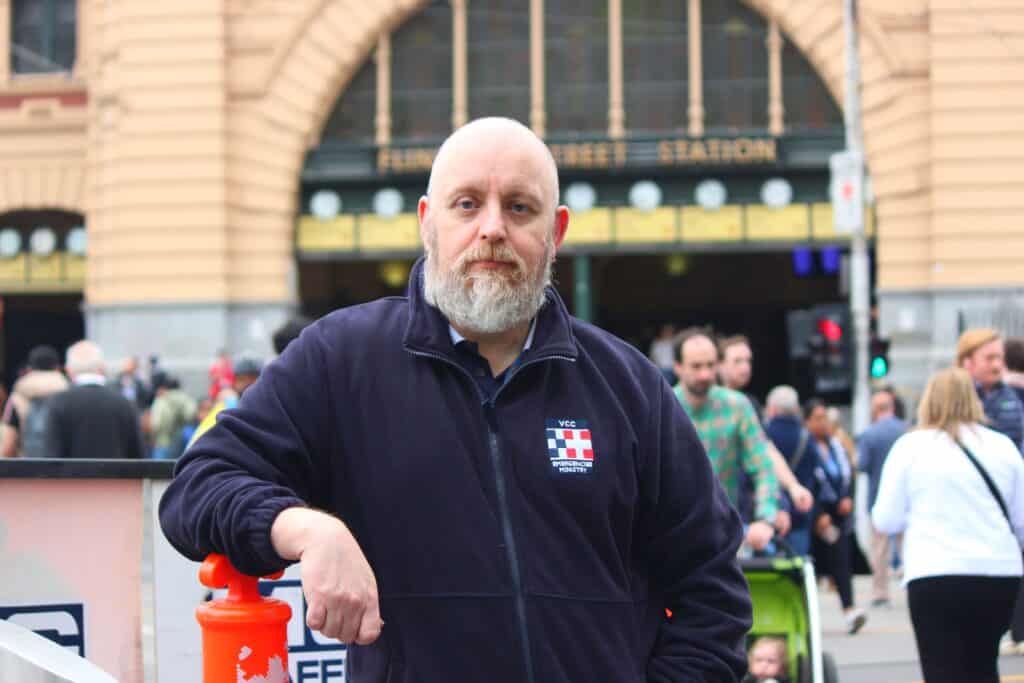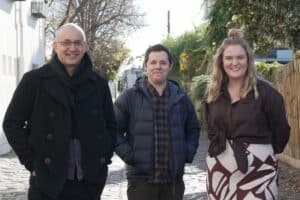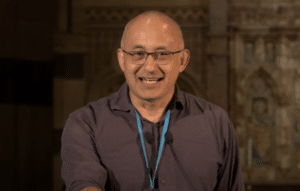
Jenan Taylor
4 October 2023
*Content warning* This piece includes description of the Bourke Street Mall tragedy.
When the Reverend Sion Gough-Hughes talks of an emergency, it’s often the Bourke Street Mall tragedy in January 2017.
Then, a man drove his car through the strip, mowing down pedestrians and unravelling lives.
Silence was just descending on the toppled pram, the scattered clothing, and the dazed people nearest the worst of the crime scene by the time the Reverend arrived.
The rampage was over, but the crisis was well underway.
Mr Gough-Hughes was among 162 Victorian Council of Churches Emergencies Ministry volunteers called to support the community over the next 12 days.
The enormity of that incident regularly makes its way into his thoughts.
“It was the biggest activation that had ever happened to us. It wasn’t necessarily the most traumatic, but it was certainly the one that had the biggest impact on those who responded,” Mr Gough-Hughes said.
A priest at the Melbourne Welsh Church, Mr Gough-Hughes became a VCC Emergencies Ministry volunteer 12 years ago.
He saw it as a chance to combine his love for helping people in crisis with the logistics and organisational experience he’d gained as former army officer.
Read more: ‘I have a responsibility to use my God-given gifts’
Since then, Mr Gough-Hughes has worked across several roles during bushfires, floods and other occurrences.
Those bushfires and floods could be traumatic and very hard particularly for people who have lost their houses. But dealing with people who had experienced the horror of watching others being maimed and killed was different, he said.
The ministry’s 1200 or so volunteers, who go through rigorous training programs, have been responding to people in catastrophe since the 1970s.
Since Bourke Street, a growing number of councils and other stakeholders have increasingly “activated” them to incidents where people were likely to be left traumatised, including natural disaster, suicide, or accident.
The organisation believes the visibility of the tragedy, the volume of people the volunteers attended to, and the way in which they worked, raised a new awareness of the ministry among the emergency response community, in particular.
Chief operations officer Edmund Murphy said the chaplains engaged with more than 3000 people during the mall incident.
In the 2022 Lismore floods, the first time the ministry’s teams were activated to an interstate disaster, they spoke with about 1610 members of the community, Mr Murphy said.
A typical call out for the chaplains might begin with a briefing via phone or at an operations centre or emergency field hub.
Once dispatched, they wander the incident area, handing out advice pamphlets and having significant conversations with whoever might be affected by what has unfolded, including other responders.
“The idea is to help people shed some of their initial shock by trying to be the calm in the sudden storm that’s hit them. We listen to them, and talk them down from their crisis point,” Mr Gough-Hughes said.
The VCC responders are made up of clergy and lay people from 26 cultures and 11 faith groups. But proselytising is not what they do.
“All the volunteers stand in their faith when they deliver the service, but unless someone specifically requests a prayer, it’s not permitted. We don’t really offer anything other than an ear. It’s not going to cure them, and it’s not going to make the situation go away, but it’s about compassion in a time of crisis,” Mr Gough-Hughes said.
Read more: Anglican leaders focused on community recovery as flood trauma persists
He has never regretted his decision to become an emergency chaplain. Each incident has held important lessons, and each in some way strengthened his belief in humanity.
In both the 2017 and recent September rampages in Bourke Street, it was the determined efforts to help that the onlookers, shopkeepers, and other emergency services personnel made wherever they could.
In the Lismore floods, it was the lady who pulled up in a tea caravan every day to offer a warming drink to whoever was around, simply because she believed they needed it.
“You do see the best of people in the worst of times,” Mr Gough-Hughes said.
It moved him so deeply, he wrote a sermon about Jesus looking like a fireman, looking like a nurse, looking like a person grieving.
But the priest said it was hard at some callouts for the chaplains to gauge what difference their efforts made for those most traumatised.
The Bourke Street Mall incident shone a light on this for them. They could actually see hope returning to people’s faces when they engaged with them, Mr Gough-Hughes said.
For him, one person in particular reflected that.
It was around one in the morning while enroute home from the first day’s debriefing, when he and a few colleagues came across a man who looked shell shocked.
“We asked if he was okay, and he slumped, and it all just came pouring out over more than an hour,” Mr Gough-Hughes said.
“It turned out this guy narrowly escaped being hit by the car, and then witnessed some of the horrific things that happened. He was in all sorts of distress. At the end, he got up and he went, ‘You’ve saved my life tonight,’ and walked off. That stuck, that really stuck. It made a difference to me.”
If you or a loved one need support, contact Lifeline on 13 11 14 or Beyond Blue on 1300 224 636.
If life is in danger, phone Triple Zero (000).
For more faith news, follow The Melbourne Anglican on Facebook, Instagram, or subscribe to our weekly emails.






